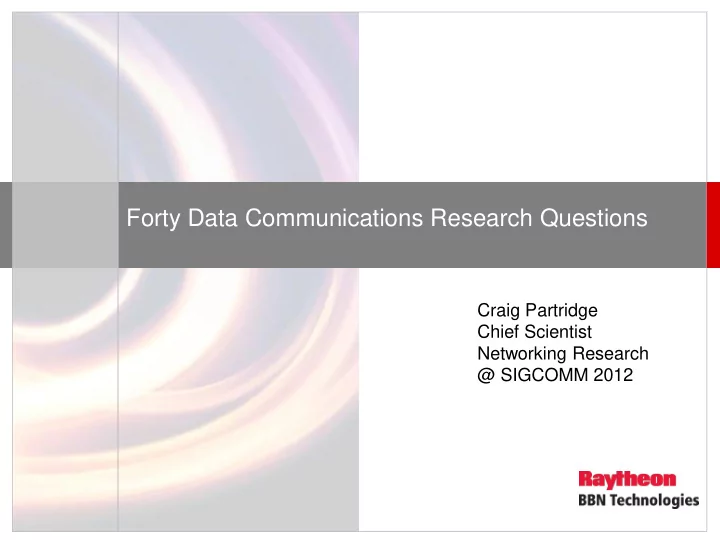

Forty Data Communications Research Questions Craig Partridge Chief Scientist Networking Research @ SIGCOMM 2012
Questions are vital to research “The questions are always more important than the answers.” ―R. Pausch To raise new questions, new possibilities, to regard old problems from a new angle, requires creative imagination and marks real advance in science.” --- A. Einstein Hilbert’s 23 questions The scientific mind does not so much provide the right answers as ask the right questions. – C. Levi-Strauss
Yet we don’t talk about them much • Despite tremendous interest in “innovation”, in the books I’ve read, the focus is on how to solve questions, not finding good questions – Indeed, most successful researchers I know tend to have ONE preferred way to generate questions • That’s an important omission – In how we do research – In how we teach folks to do research
And we tend to hoard questions • People don’t tend to share their list of unsolved questions • Yet having questions at the ready is useful – For grad students • often finding a question is hard for them – For the field • My “oops” moment was when Bob Lucky asked me what the current good research questions were
What makes a good research question? • Worth the attention of multiple (new) researchers – If 5 different research teams chase the question, they should all benefit – Turing and Godel were chasing the same Hilbert question • An answer should open up substantial follow on efforts (either in research or industry or both) • Likely to reward attention – Don’t lead folks to beat against a brick wall • Some chance the result will have an impact – “impact” is hard to measure (e.g. Pigou on pollution effects)
The questions • Research shows that having me read the 40 questions is pretty boring – Apologies to Grenville’s research group! • So I’ll just present three examples
What are the incentives for an implementation to faithfully follow the protocol specification? – Shneidman and Parkes An excellent question that targets a well-defined subset of an otherwise large and hard to characterize problem (tussle spaces).
Are transient network addresses possible? Addresses contain little or no topology information and can be created and deleted at will. An application can use a different address with every transaction. If yes, a lot of existing topics such as geolocation and identity and tracing get reopened.
What happens if we give radios multiple power levels (on, off, and one or more intermediate states)? Most wireless energy research Redi An example of how an innovative piece of work raises a whole host of new questions. (And our occasional reluctance to accept it).
Two Warnings at the End • While I tried to pick only questions that did not have answers, no promises the solution isn’t hiding somewhere I missed. • The list makes no attempt to balance among different subareas of data communications – While sometimes I intentionally left areas out, more often the absence is due to ignorance
Thank you to SIGCOMM for this honor! And, of course, I welcome questions!
Recommend
More recommend